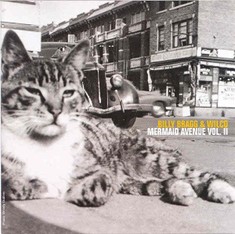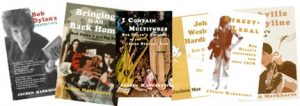by Jochen Markhorst
XIII A little bit of Lincoln can’t park the car
Pink pedal pushers and red blue jeans
All the pretty maids and all the old queens
All the old queens from all my past lives
I carry four pistols and two large knives
I’m a man of contradictions and a man of many moods
. . . I contain multitudes
 A first association might lead the Dylan fan back to that loving, charming Woody Guthrie project Mermaid Avenue, which, after a Vol. 1 in 1998, was followed up in 2000 with Vol. 2 and finally completed in 2012 with the release of a box set that also includes a Vol. 3. In total, it ends up being 47 songs, all set to lyrics from Woody Guthrie’s estate, lyrics that on average some 50 years after their creation are finally set to music by the men of Wilco and by Billy Bragg.
A first association might lead the Dylan fan back to that loving, charming Woody Guthrie project Mermaid Avenue, which, after a Vol. 1 in 1998, was followed up in 2000 with Vol. 2 and finally completed in 2012 with the release of a box set that also includes a Vol. 3. In total, it ends up being 47 songs, all set to lyrics from Woody Guthrie’s estate, lyrics that on average some 50 years after their creation are finally set to music by the men of Wilco and by Billy Bragg.
It is a successful, respectful project that is rightly well received, and the timing of that last release, Mermaid Avenue: The Complete Sessions is perfectly chosen: on the centenary of Woody Guthrie’s birth. Dylan most likely followed it all with above-average interest – after all, Guthrie is one of his artistic fathers, his personal catalyst, a role model. “The songs themselves, his repertoire, were really beyond category,” as he swoons in Chronicles, and
“It was like I had been in the dark and someone had turned on the main switch of a lightning conductor.”
In those 47 songs, we hear plenty of turns of phrase, jargon and imagery that seem to echo in Dylan’s songs. For instance, in the witty “Meanest Man”; I’d preach the gospel of hate and I’d drink your blood, which we would effortlessly classify as a Rough And Rowdy Ways -verse fragment, or
If my wife didn't kiss me the way she does I'd carry four or five daggers and three or four guns I'd shoot craps and ramble and hang out late I'd steal baby buggies and Cadillac Eights
Billy Bragg/Wilco – Meanest Man:
… which seems to be a source for the slightly hysterical verse I carry four pistols and two large knives from this fifth verse of “I Contain Multitudes”. Attractive option, but incorrect, as James Adams of Bob Dylan Notes discovers and tweets on the very day of its release, 17 April 2020. Not Woody. We need to go back even further.
“It reminded me of some old still images I’d seen of the Civil War. How much did I know about that cataclysmic event? Probably close to nothing,” writes Dylan in his autobiography, reflecting back on his early days, on those first floundering months in New York. But he catches up on his knowledge gap. In the decades that follow, he remains a fascinated student of American history. Well, of U.S. history anyway, and especially of those disastrous years 1861-65, the years of the Civil War. Images and motifs can be heard surfacing in songs like “John Brown” and “Blind Willie McTell”, Dylan regularly plays Civil War ballads (“Two Soldiers”, “The Lakes of Pontchartrain”), and a highlight, of course, is Dylan’s contribution to the Civil War film Gods And Generals (2003), “‘Cross The Green Mountain”.
During self-tuition, in particular Shelby Foote’s The Civil War – A Narrative, the 3,000-page monumental work published in three volumes between 1958 and 1974, makes an impression, apparently. True, in 2012 he proclaims that neither reading Grant’s memoirs nor Foote’s reconstruction can be compared to studying newspaper accounts of the time;
“Shelby Foote is looking down from a high mountain, and Grant is actually down there in it. Shelby Foote wasn’t there. Neither were any of those guys who fight Civil War re-enactments. Grant was there, but he was off leading his army. He only wrote about it all once it was over. If you want to know what it was about, read the daily newspapers from that time from both the North and South. You’ll see things that you won’t believe.”
(Rolling Stone interview with Mikal Gilmore)
… but at the latest since his 2001 album “Love And Theft”, we see phrases, images and idioms from Foote’s pièce de résistance popping up in Dylan’s songs.
In “Floater”, for example. Word combinations like “grove of trees”, and remarkable, undylanesque idioms like “squall”, “timber” and “dazzling” are utterly common with Foote, but never occur in Dylan’s oeuvre elsewhere. The verses with which Dylan opens the last verse of “Floater”, If you ever try to interfere with me or cross my path again / You do so at the peril of your own life come verbatim from Volume 2, Fredericksburg to Meridian (1963);
“I have stood your meanness as long as I intend to. You have played the part of a damned scoundrel, and are a coward, and if you were any part of a man I would slap your jaws and force you to resent it. You may as well not issue any more orders to me, for I will not obey them … and I say to you that if you ever again try to interfere with me or cross my path it will be at the peril of your life.”
From Chapter 8, The centre gives, the words Foote puts into the mouth of General Nathan Bedford Forrest, the words with which he lashes out at his immediate commander, General Baxton Bragg, who, incidentally, is indeed regarded by historians as one of the worst generals of the South. And the décor of Dylan’s song, finally, also looks very familiar to readers of Foote’s standard work: the Ohio, the Cumberland, the Tennessee / All the rest of them rebel rivers.
It’s not a one-off wink, this colouring songs with idioms or phrases or even fun facts (Ever since the British burned the white house down from 2012’s “Narrow Way”, for example) from American history. And here on Rough And Rowdy Ways, that motif culminates – where a sub-motif seems to be “dead presidents”; Kennedy and Johnson in “Murder Most Foul”, McKinley and Truman in “Key West”, and here then, indirectly, the reference to Lincoln:
While they waited, Lincoln heard a drunk bawling “Dixie” on the quay. Lamon, with his bulging eyes and sad frontier mustache, sat clutching four pistols and two large knives. At last the car was picked up by a train from the west, and Lincoln stepped onto the Washington platform at 6 o’clock in the morning. “You can’t play that on me,” a man said, coming forward. Lamon drew back his fist. “Don’t strike him!” Lincoln cried, and caught his arm, recognizing Elihu Washburn, an Illinois congressman.
(The Civil War – A Narrative, Volume 1, “Prologue – The Opponents”)
… the reference to Lincoln’s bodyguard Ward Hill Lamon, who with four pistols and two large knives may have been a bit over-armed, but as an image in a song lyric it works well. And, on reflection, also sheds new light on that much-discussed, enigmatic distich of another highlight on Rough And Rowdy Ways, on the opening lines of “Crossing The Rubicon”: “I crossed the Rubicon on the 14th day / Of the most dangerous month of the year”. After all, Lincoln was cowardly shot from behind by the lowly John Wilkes Booth on Good Friday 14 April 1865 – Good Friday, the day the Lamb of God was crucified,
Good day to be livin’ and a good day to die
Being led to the slaughter like a sacrificial lamb
… as the narrator in “Murder Most Foul” says about the day that other president, Kennedy, is assassinated. In which he also cannot resist to recall that Kennedy was in the backseat of a Lincoln when he was shot – also through the back of the head.
All too thin to really speak of a theme, but that loose association that Dylan accepts of “Lincoln” as a sub-motif on the album seems plausible. Or else the Willie Dixon song DJ Dylan plays on his Theme Time Radio Hour in 2008 (Little Walter’s version), “Dead Presidents”;
Them dead presidents Them dead presidents Well I ain't broke but I'm badly bent Everybody loves them dead presidents
… “a little bit of Lincoln can’t park the car – a five hundred McKinley is the one for me.”
To be continued. Next up I Contain Multitudes part 14: I’ll huff, and I’ll puff, and I’ll blow your house in
————-
Jochen is a regular reviewer of Dylan’s work on Untold. His books, in English, Dutch and German, are available via Amazon both in paperback and on Kindle:
- Blood on the Tracks: Dylan’s Masterpiece in Blue
- Blonde On Blonde: Bob Dylan’s mercurial masterpiece
- Where Are You Tonight? Bob Dylan’s hushed-up classic from 1978
- Desolation Row: Bob Dylan’s poetic letter from 1965
- Basement Tapes: Bob Dylan’s Summer of 1967
- Mississippi: Bob Dylan’s midlife masterpiece
- Bob Dylan’s Greatest Hits
- John Wesley Harding: Bob Dylan meets Kafka in Nashville
- Tombstone Blues b/w Jet Pilot: Dylan’s lookin’ for the fuse
- Street-Legal: Bob Dylan’s unpolished gem from 1978
- Bringing It All Back Home: Bob Dylan’s 2nd Big Bang
- Time Out Of Mind: The Rising of an Old Master
- Crossing The Rubicon: Dylan’s latter-day classic
- Nashville Skyline: Bob Dylan’s other type of music
- Nick Drake’s River Man: A very British Masterpiece
- I contain Multitudes: Bob Dylan’s Account of the Long Strange Trip


Wow! Yet more amazing research. Thank you Jochen!
Merci Mark.